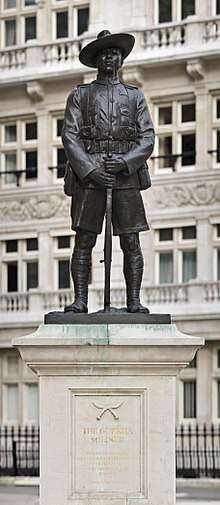Nepalese in the United Kingdom
Nepalese in the United Kingdom (also British Nepalese, Nepalese British, British Nepali) are British citizens or full-time residents of the United Kingdom whose ethnic origins lie fully or partially in Nepal.
| Total population | |
|---|---|
| Nepali-born residents 50,881 (2011 UK Census) | |
| Regions with significant populations | |
| London · South East England | |
| Languages | |
| English · Nepali · Khambu · Limbu · Gurung · Magar | |
| Religion | |
| Hinduism · Buddhism · Kirant Mundhum · Christian | |
| Related ethnic groups | |
| Nepali people · Gurung · Limbu · Rai · Magar · Chhetri · Newar |
History

From the first quarter of the 19th century, Gurkhas from Nepal served in the British Army, and Gurkha soldiers' families lived in the UK. People from Nepal living in the UK belong to many different Nepalese ethnic groups or castes and may have different languages although all speak Nepali as a mother tongue.
In 1965, the first settlement of London's Nepalese community was made at 145 Whitfield Street in Camden. A commemorative plaque now stands on the site.[1]
Demographics
The 2001 UK Census recorded 5,943 Nepali-born people were residing in the UK.[2] In 2008, the president of the Himalayan Yeti Nepalese Association was reporting as estimating that up to 50,000 Nepalese might be living in the UK.[3] The 2011 UK Census recorded 48,497 people born in Nepal living in England, 1,011 in Wales,[4] 1,268 in Scotland[5] and 105 in Northern Ireland.[6] Office for National Statistics estimates suggest that 62,000 Nepalese-born people were resident in the UK in 2016.[7]
At the time of the 2011 census, the regions with the largest Nepalese-born populations were London and South East England, with 19,051 and 19,111 people respectively.[4] Of the 49,508 Nepalese-born in England and Wales, 56 per cent stated that they were Hindus, 25.9 per cent Buddhists and 3.8 per cent Christians. 1.7 per cent stated that they did not have a religion and a small number specified other religions. 11.8 per cent did not provide an answer to the religion question.[8] 52.9 per cent of the Nepalese-born population of England and Wales had arrived during the period 2007 to 2011, 34.6 per cent between 2001 and 2006, 11.4 per cent between 1981 and 2000, and 1.1 per cent prior to 1981.[8]
Employment
As of 1 April 2019, 3,430 Gurkhas were serving in the British Army.[9] According to the 2001 UK census, 34.8 per cent of Nepalese-born people in London were working in hotels or restaurants, 15.7 per cent in real estate and renting, 15.3 per cent in wholesale and retail, 9.6 per cent in health and social care.[3]
Notable individuals
See also
- List of Nepal-related topics
References
- "Plaque: Nepali Community". Londonremembers.com. Retrieved 25 January 2013.
- "Country-of-birth database". Organisation for Economic Co-operation and Development. Retrieved 2008-12-30.
- Sims, Jessica Mai (2008). Soldiers, Migrants and Citizens: The Nepalese in Britain (PDF). London: Runnymede Trust. ISBN 978-1-906732-09-7.
- "2011 Census: Country of birth (expanded), regions in England and Wales". Office for National Statistics. 26 March 2013. Retrieved 3 April 2018.
- "Country of birth (detailed)" (PDF). National Records of Scotland. Retrieved 3 April 2018.
- "Country of Birth – Full Detail: QS206NI". Northern Ireland Statistics and Research Agency. Retrieved 3 April 2018.
- "Table 1.3: Overseas-born population in the United Kingdom, excluding some residents in communal establishments, by sex, by country of birth, January 2016 to December 2016". Office for National Statistics. 24 August 2017. Retrieved 3 April 2018. Figure given is the central estimate. See the source for 95% confidence intervals.
- "CT0265 - Country of birth by year of arrival by religion". Office for National Statistics. 10 October 2014. Retrieved 3 April 2018.
- "UK Armed Forces Quarterly Service Personnel Statistics 1 April 2019" (PDF). Ministry of Defence. 16 May 2019. p. 4. Retrieved 27 July 2019.